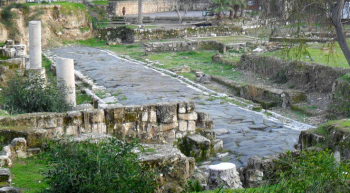In consequence of the range of Mount Taurus, near Paul's hometown of Tarsus, Cilicia has a greater geographical affinity with Syria than with Asia Minor. Hence it has existed in frequent political combination with it from the time of the old Persian satrapies to the modern pachalics of the Sultan. Syria and Cilicia appears in history almost as a generic geographical term, the more important district being mentioned first.
Within the limits of this region activities of Paul were now exercised in studying and in teaching at Tarsus, or in founding those Churches which were afterwards greeted in the Apostolic letter from Jerusalem, as the brethren "in Antioch, and Syria, and Cilicia."
Whatever might be the extent of the journeys of Paul within these limits, we know at least that he was at Tarsus. Once more we find him in the home of his childhood. It is the last time we are distinctly told that he was there. Now at least, if not before, we may be sure that he would come into active intercourse with the Heathen philosophers of the place.

In his last residence at Tarsus, a few years before, Paul was a Jew, and not only a Jew but a Pharisee, and he looked on the Gentiles around him as outcasts from the favor of God. Now he was a Christian, and not only a Christian, but conscious of his mission as the Apostle of the Gentiles. Therefore he would surely meet the philosophers, and prepare to argue with them on their own ground, as afterwards in the market at Athens with the Epicureans and the Stoics (Acts 17:17 - 18).
Many Stoics of Tarsus were men of celebrity in the Roman Empire. Athenodorus, the tutor of Augustus, has already been mentioned. He was probably by this time deceased, and receiving those divine honors, which, as Lucian informs us, were paid to him after his death. The tutor of Tiberius also was a Tarsian and a Stoic. His name was Nestor. He was probably at this time alive, for he lingered to the age of ninety-two, and, in all likelihood, survived his wicked pupil, whose death we have recently noticed.
How far the arguments of Paul had any success in this quarter we cannot even guess, and we must not anticipate the conversion of Cornelius. At least, he was preparing for the future.
In the synagogues of Tarsus we cannot believe that Paul was silent or unsuccessful. In his own family, we may well imagine that some of those Christian "kinsmen" (Romans 16) whose names are handed down to us, possibly his sister, the playmate of his childhood, and his sister's son, who afterwards saved his life, were at this time by his exertions gathered into the fold of Christ.